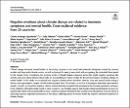Negative emotions about climate change are related to insomnia symptoms and mental health: cross-sectional evidence from 25 countries
Date
2021-02-16Author
Ogunbode, Charles Adedayo
Pallesen, Ståle
Böhm, Gisela
Doran, Rouven
Bhullar, Navjot
Aquino, Sibele
Marot, Tiago
Schermer, Julie Aitken
Wlodarczyk, Anna
Lu, Su
Jiang, Feng
Salmela-Aro, Katariina
Hanss, Daniel
Maran, Daniela Acquadro
Ardi, Rahkman
Chegeni, Razieh
Tahir, Hajra
Ghanbarian, Elahe
Park, Joonha
Tsubakita, Takashi
Tan, Chee-Seng
Broek, Karlijn L. van den
Chukwuorji, JohnBosco Chika
Ojewumi, Kehinde
Reyes, Marc Eric S.
Lins, Samuel
Enea, Violeta
Volkodav, Tatiana
Sollar, Omas
Navarro-Carrillo, Ginés
Torres-Marín, Jorge
Mbungu, Winfred
Onyutha, Charles
Lomas, Michael J.
Metadata
Show full item recordAbstract
Climate change threatens mental health via increasing exposure to the social and economic disruptions created by extreme weather and large-scale climatic events, as well as through the anxiety associated with recognising the existential threat posed by the climate crisis. Considering the growing levels of climate change awareness across the world, negative emotions like anxiety and worry about climate-related risks are a potentially pervasive conduit for the adverse impacts of climate change on mental health. In this study, we examined how negative climate-related emotions relate to sleep and mental health among a diverse non-representative sample of individuals recruited from 25 countries, as well as a Norwegian nationally-representative sample. Overall, we found that negative climate-related emotions are positively associated with insomnia symptoms and negatively related to self-rated mental health in most countries. Our findings suggest that climate-related psychological stressors are significantly linked with mental health in many countries and draw attention to the need for cross-disciplinary research aimed at achieving rigorous empirical assessments of the unique challenge posed to mental health by negative emotional responses to climate change.
URI
https://link.springer.com/article/10.1007/s12144-021-01385-4#Abs1https://link.springer.com/article/10.1007/s12144-021-01385-4#Abs1
https://kyuspace.kyu.ac.ug/xmlui/handle/20.500.12504/817

